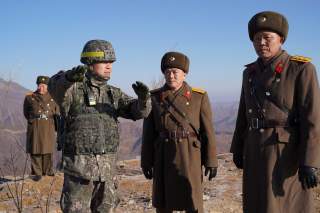Eric Gomez: My North Korea Prediction for 2019
Kim Jong Un’s New Year address will be an important stage-setter.
Editor's Note: Looking for more perspectives on North Korea? Check out all 27 expert predictions on North Korea in 2019 here.
Inter-Korean détente and the Trump-Kim summit offered a welcome respite from the “fire and fury” of 2017. Looking ahead to 2019, there is a miniscule chance that Kim will give up his nuclear weapons, but it is equally unlikely that war will break out. The inter-Korean peace process will likely continue making progress on reducing the risk of military conflict, building trust, and increasing economic connectivity.
The biggest source of uncertainty is Washington. The Trump administration could adhere to its denuclearization or bust policy, but this has a slim chance of success and risks damaging the U.S.-South Korea alliance. However, if the administration is willing to change its approach to North Korea, it could make Northeast Asia safer in the near term while also increasing the likelihood of denuclearization in the future.
Kim Jong Un’s New Year address will be an important stage-setter. Restating his desire to shift away from the byungjin policy and focus on economic development, praising inter-Korean diplomacy, and committing to future summits would all be positive signals. Some bluster directed at either South Korea or the United States could make it into the speech, but this is relatively insignificant if Kim maintains course on his current policies.
South Korea’s president Moon Jae-in will keep forging ahead with the inter-Korean peace process. Unlike the Singapore summit, Moon’s meetings with Kim have produced real policy results including military confidence-building measures that reduce the risk of conflict in the demilitarized zone. Inter-Korean summits have also proved popular with South Koreans, briefly bolstering Moon’s popularity despite ongoing economic anxieties.
At its core, Moon’s approach to inter-Korean negotiations prioritizes building trust and changing the fundamental nature of the relationship over denuclearization whereas the United States has pushed for denuclearization first. South Korea and U.S. goals are similar, but this difference in prioritization is straining the alliance relationship as Washington worries about Seoul getting too far ahead in the peace process.
Since Moon’s approach has clearly produced more positive results, the Trump administration should adjust U.S. policy to better align it with Seoul. This does not mean that the United States must give up on denuclearization. Instead, such a change would reflect an understanding that denuclearization won’t happen quickly, and the United States is willing to be patient to accomplish it. There is no guarantee that such an approach will result in denuclearization, but it would be a marked improvement over Washington’s current strategy.
Eric Gomez is a policy analyst for defense and foreign-policy studies at the Cato Institute.
Image: Reuters


